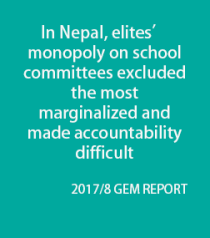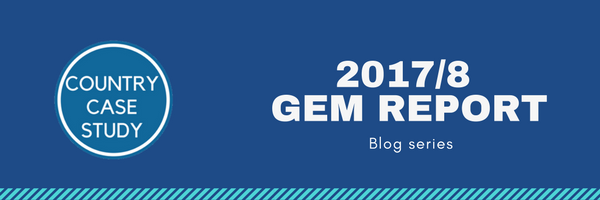This blog is written by Dr Jamila Razzaq, Co-founding President Aappa Aziz Trust Pakistan and Haider Fancy, Chief of Strategy, Planning, and Development, Nasra Public Schools, also authors of a case study on accountability and education in Pakistan commissioned for the 2017/8 GEM Report. The blog is part of a series showing that accountability in education is shaped by a country’s history and political, social, and cultural context.
Background: Pakistan’s education system
Since the creation of the state of Pakistan in 1947, there has been a four-tier education system: madrassas (religious schools), private schools (English and Urdu), public schools, and army schools. Pakistan followed a centralised education system until the passage of the 18th amendment in April 2010, which decentralized education, limited the role of the federal government, and expanded the purview of provinces.
Pakistan has seen many improvements in its public education system over the past few years in line with the increased in the share of total government expenditure on education to 13.2%. The teacher recruitment process has steadily drifted towards merit based hiring, especially in Khyber Pakhtunkhwa and Punjab provinces, where the introduction of improved monitoring processes has also reduced unauthorized absenteeism and the phenomenon of Large government and donor-funded initiatives have also improved school infrastructure.
 Yet, at the same time, the growth of enrolment in private primary schools from about 18 million students in 2010 to about 20 million in 2015-16 is proof that families are willing and able to pay for schooling.
Yet, at the same time, the growth of enrolment in private primary schools from about 18 million students in 2010 to about 20 million in 2015-16 is proof that families are willing and able to pay for schooling.
Still, there remain at least 24 million children, adolescents and youth out of school. Even more alarming is the fact that basic literacy and numeracy skills leave much to be desired. The latest Annual Status of Education Report demonstrates that only about 15% of grade 2 students had grade level competency in English or arithmetic and about 17% had grade level competencies in their local languages.
To achieve meaningful improvements in access to education and the quality of education, systems of accountability need to identify the gaps in education provision at local, regional and national levels. There is investment in monitoring mechanisms but their focus on enrolment and physical infrastructure is narrow.
 An essential component of an effective accountability system is the active participation of all stakeholders. In Pakistan, spaces for meaningful interactions between these officials, teachers and parents need to be constructed. It is important to build the capacity of families and communities to engage, especially when they live in challenging socio-economic conditions.
An essential component of an effective accountability system is the active participation of all stakeholders. In Pakistan, spaces for meaningful interactions between these officials, teachers and parents need to be constructed. It is important to build the capacity of families and communities to engage, especially when they live in challenging socio-economic conditions.
The aggressive growth of the private sector over the last two decades, strong government regulations holding these schools to account, and the general perception concerning the low quality of education in public schools have introduced a divide. Families who have access to private education services and can afford them, prefer to send their children there. Those families who send their children to public schools generally cannot afford even low fees or live in remote areas with no private services. The power dynamics between socially deprived, economically constrained and educationally underdeveloped families and socially resourceful, salaried and educated families are skewed.
 The current mechanisms for empowered action and purposeful engagement from parents and communities are the Parent Teacher Associations (PTAs) or Parent Teacher School Management Committees (PTSMCs). These groups are trained and sensitized and hold irregular dialogues with education providers. These are necessary but not sufficient conditions to improve student learning. Parents who undergo this training are still limited to a scope of responsibilities too narrowly defined to understand and address issues within the larger school ecosystem.
The current mechanisms for empowered action and purposeful engagement from parents and communities are the Parent Teacher Associations (PTAs) or Parent Teacher School Management Committees (PTSMCs). These groups are trained and sensitized and hold irregular dialogues with education providers. These are necessary but not sufficient conditions to improve student learning. Parents who undergo this training are still limited to a scope of responsibilities too narrowly defined to understand and address issues within the larger school ecosystem.
For the public system, it is not enough to engage parents in monitoring quality. These forums will need encourage, respect and respond to parents’ voices. Their role will need  to be enhanced from merely channeling school development plan funds to include learning improvement agendas that meaningfully engage parents and the school community. This can be done generally through bringing quality of learning at the heart of all engagements and building trust among parents and schools as true partners. Specifically however, it is necessary to develop meaningful strategies and procedures, for a culture that is still steeped in the context of a formal and stringent hierarchy.
to be enhanced from merely channeling school development plan funds to include learning improvement agendas that meaningfully engage parents and the school community. This can be done generally through bringing quality of learning at the heart of all engagements and building trust among parents and schools as true partners. Specifically however, it is necessary to develop meaningful strategies and procedures, for a culture that is still steeped in the context of a formal and stringent hierarchy.
 Conversely, parents who send their children to private schools have more regular dual-direction contact with their service providers. In high-fee charging private schools, parents keep service providers closely accountable. They keep an eye on their children’s learning and are able to hold the school to account through exerting more social influence within cloistered or increasingly connected communities. Consequently, many parents aspire – but cannot afford – to send their children to these schools. This demand has led to the mushrooming of low-fee private schools where the quality of teaching is not much better than that of public schools, but cater to socio-economic groups that do not have the time or capacity to act as effective checks and balances to these schools.
Conversely, parents who send their children to private schools have more regular dual-direction contact with their service providers. In high-fee charging private schools, parents keep service providers closely accountable. They keep an eye on their children’s learning and are able to hold the school to account through exerting more social influence within cloistered or increasingly connected communities. Consequently, many parents aspire – but cannot afford – to send their children to these schools. This demand has led to the mushrooming of low-fee private schools where the quality of teaching is not much better than that of public schools, but cater to socio-economic groups that do not have the time or capacity to act as effective checks and balances to these schools.
Ensuring that all children attend school and attain their full potential should be a shared responsibility of governments, parents, students, community members and teachers. The government being the custodian of children’s right to quality education will have to take lead in creating a culture where shared responsibility, discussion and meaningful dialogue are prioritized.
Recommendations
- Improve communication between government, community organizations and parents.
- Energize forums for citizen voice, advocacy and parental activism on educational development.
- Develop standards and clearly communicate benchmarks for services of teachers and education managers, curriculum, assessments, school facilities and textbooks along with sanctions for not meeting them.
- Make disaggregated allocations, ensure timely release of funds and track spending on quarterly basis, while making information on financial performance publicly available.
- Regulate and monitor the private sector and provide support for the affordability of their services.
- In international partnerships, link budgetary support with strong evidence of performance and facilitate civil society in establishing efficient and accountable development models that strive to ensure not simply a ‘race for the numbers’ approach.
2017/8 GEM Report recommendations
| Global | Pakistan |
| Governments must make the right to education justiciable in national law, which is not the case in 45% of countries. | The right to education is justiciable in national law. |
| Governments should be transparent about the strengths of weaknesses of education systems, opening policy processes to broad and meaningful consultation and publishing a regular education monitoring report. | Pakistan has produced one national education monitoring report since 2010 covering all education levels apart from early childhood education. |
| Governments should develop credible and efficient regulations with associated sanctions for all education providers, public and private, that ensure non-discrimination and the quality of education. | There are no regulations for public or private schools on health and safety. Although 30% of pupils in Pakistan are in private schools, while there are regulations on the numbers of pupils per teacher in public schools, there are none for private schools. |
| Governments should design accountability for schools and teachers that is supportive and formative, and avoids punitive mechanisms. | Pakistan does not use student test scores to sanction and reward teachers or schools. |
| Governments should fulfil their commitment of spending at least 4% of GDP on education or allocating 15% of total government expenditure. | Pakistan has not reached either of the two financing targets for education, spending 2.6% of GDP and 13% of public expenditure on education. |
See the full set of blogs in this series
READ ALL COUNTRY CASE STUDIES COMMISSIONED FOR THE 2017/8 GEM REPORT






The right to education is justiciable in Pakistan but it falls short of SDG requirement of 12 years of free and quality education. Current laws provide for 10 years of education.
LikeLike